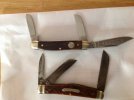- Joined
- Apr 29, 2010
- Messages
- 10
I have been buying the old Bokers of my youth. and the latest has "Alemania" on it and after a search read where it might have been for the Spanish market and that "Alemania" is Spanish for "all men". Is that the story or did Boker have other ideas in mind ? This is a three blade folder showing lots of use which is fine by me. It will get more as an EDC Squirrel Skinner etc. It will share its' duties with other old Bokers, LOL. My new Bokers are just two nice to use, ha. All company information would be appreciated.
After more research I found the following which is interesting. The Germans evidently love their history.
"The answer is actually geographical. Spanish, just like French, and Portuguese, among others, are romantic languages. This means, by consequence, that they have their roots on Roman Latin. Now, going back to the roman empire; Romans used a lot of words to describe the German tribes across time, and even some to describe the whole Germanic territory. Notably, during about the time of some of the roman expansions to what is now Spain and France (around the birth of the roman empire), they used the word "Alamania" to refer to broadly the germanic territory, solely because the Alemanni was the tribe that occupied territory closer to the Empire, and had the most contact with it, and that's the reason why "Alemania" and its variants are used to refer to Germany in Romantic Languages.
So there you go ! The collection of knives is itself a 'labor of love', we study the faint writing and become intrigued with old knives and some will pay scandalous dollars for them due to some obscure proof mark etc. It goes way beyond the utility of the piece......
After more research I found the following which is interesting. The Germans evidently love their history.
"The answer is actually geographical. Spanish, just like French, and Portuguese, among others, are romantic languages. This means, by consequence, that they have their roots on Roman Latin. Now, going back to the roman empire; Romans used a lot of words to describe the German tribes across time, and even some to describe the whole Germanic territory. Notably, during about the time of some of the roman expansions to what is now Spain and France (around the birth of the roman empire), they used the word "Alamania" to refer to broadly the germanic territory, solely because the Alemanni was the tribe that occupied territory closer to the Empire, and had the most contact with it, and that's the reason why "Alemania" and its variants are used to refer to Germany in Romantic Languages.
So there you go ! The collection of knives is itself a 'labor of love', we study the faint writing and become intrigued with old knives and some will pay scandalous dollars for them due to some obscure proof mark etc. It goes way beyond the utility of the piece......
Last edited:

